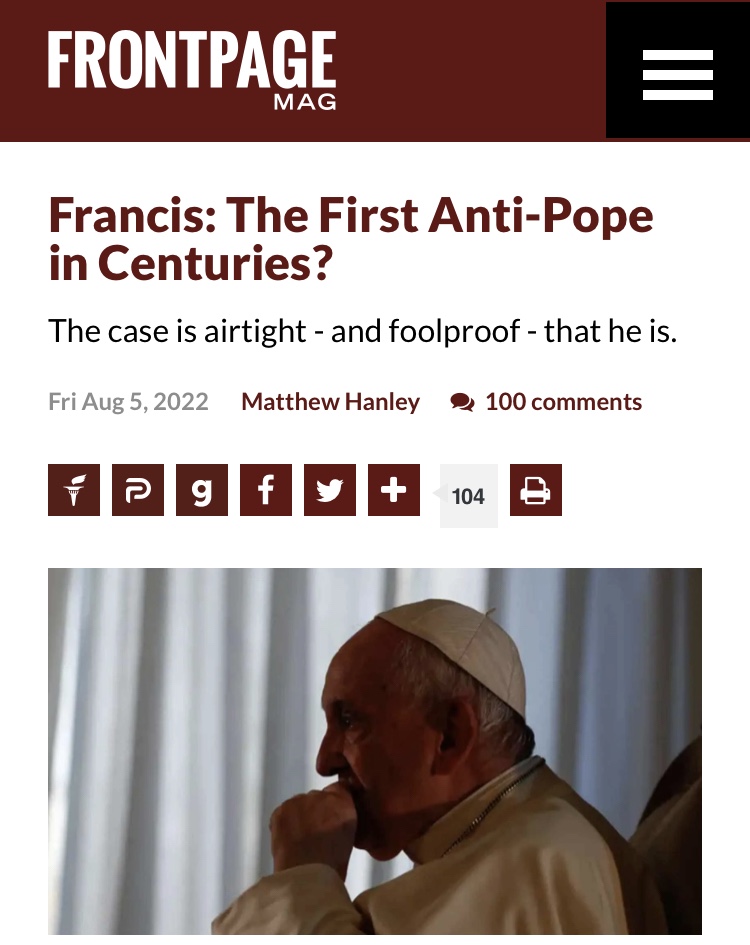“Francis: The First Antipope in Centuries? The case is airtight – and foolproof – that he is.”
Matthew Hanley is a widely-published Catholic bio-ethicist. This is big, folks. Expect more like this.
Mr. Hanley, if you read this, believe me when I tell you that every serious scholar and churchman (and there are MANY) who are looking at the abdication question all know that the issue here is Ratzinger’s substantially erroneous attempt to “fundamentally transform” the papacy into a “collegial, synodal, shared ministry”. Everyone who has read ANY of Ratzinger’s massive oeuvre, especially the pre-Papacy phase knows this is true. Further, people who know him personally know him to be a man prone to quitting. There’s no other way to put it. He ran. And yes, that is absolutely horrific, and why we have to get someone to tell him that his resignation was invalid, and pray unceasingly for him before he dies. What a fearsome thing – and what a massive heresy and act of selfish uncharity to claim that “Popes can never be in danger of hell.”
Here’s the Frontpage Mag piece.
Excerpt below.

“He is an anti-pope because Benedict XVI did not validly renounce the Papal office as required by Canon Law – the most recent 1983 version of which he himself helped craft. Therefore there should never have been a conclave following his surprising February 11, 2013 announcement known as the Declaratio. This would be the case even if someone other than Bergoglio had been chosen, and even if Bergoglio hadn’t done and said all the things he’s done and said.
[…]
So one day I said to myself: I am going to look into it. I am going to read what people who claim Bergoglio is an anti-Pope have to say – and evaluate their arguments. Not their personality or writing style, nor their position within “society” or the Church, but the thrust of their arguments. [He’s totally talking about me – at least a little. Yay! 😎] I wouldn’t have to commit. I could just sit with it all for a while. And so that’s what I did.
First off, I was a bit surprised to learn that immediately after Benedict XVI’s Declaratio (within days), prominent Latinists, canonists, philosophers, theologians and journalists were pointing out significant errors in the Latin text Benedict XVI had delivered. Do such errors always nullify a juridical act? Possibly not. But let’s just say it raised eyebrows even at that time.
Most significantly, though, I was struck by the simplicity and persuasiveness of the contention that, from an objective point of view, Benedict XVI’s Declaratio does not adequately constitute a valid Papal renunciation as stipulated by canon law. If the relevant canonical requirements are not satisfied in the communicated act of renunciation, no other circumstance (e.g. “everyone now accepts Bergoglio as the Pope), event (e.g. a conclave), or rationalization, whenever expounded, can validate it. At its core, it really is that simple.
[…]
Yet it is right and just for Catholics to grapple with the evidence that Bergolio is an anti-Pope. The facts and the arguments are out there, and the case is rather airtight – foolproof, in my humble estimation. This is not an arbitrary or agenda-driven personal judgment but the outcome of a sincere reading and dutiful application of the pertinent Canon law, which alone dictates the verdict.
